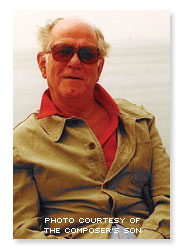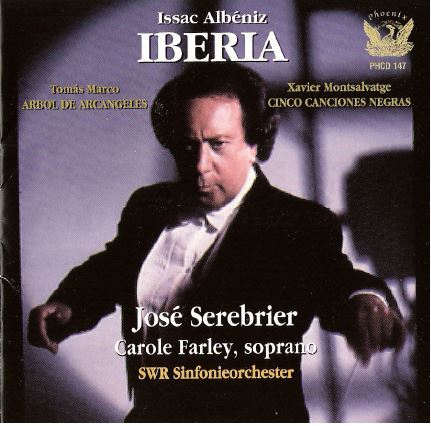
Montsalvatge, Xavier
Xavier Montsalvatge i Bassols ; 11 March 1912 – 7 May 2002) was a Spanish composer and music critic. He was one of the most influential music figures in Catalan music during the latter half of the 20th century.
Montsalvatge’s style evolved over several different phases. At the start of his career, he was strongly influenced by the twelve-tone technique and by Wagnerism, which together dominated the Catalan music scene during the period represented by his Sinfonía mediterránea of 1949. In the following period, he found inspiration in the music of the Antilles (Cinco canciones negras, 1945; Cuarteto indiano, 1952). His steady contact with the French composers Olivier Messiaen and Georges Auric led to a crucial change in his style, which soon became characterized by free polytonality (Partida, 1958). The final phase of Montsalvatge’s work revealed the influence of the avant-garde.
Montsalvatge explored virtually all musical forms in his composition. His work ranges in scale from operas (El gato con botas, Una voz en off) to chamber music (Cuarteto indiano), in between which lie his orchestral works, such as the Desintegración morfológica de la Chacona de Bach, the Laberinto o Sinfonía de réquiem, and the prizewinning Sinfonía mediterránea. He owed his international fame chiefly to one charming and outstanding work: the Cinco canciones negras for mezzo-soprano and orchestra, a blend of Antillean rhythms and themes; among them, the best known is the Canción de cuna para dormir un negrito (Lullaby to sleep a black child). He wrote film music and in 1987, his score for the picture Dragon Rapide, about Francisco Franco, was nominated as the best original music at the Goya Awards.
Important works
- Cinco canciones negras (1945) (Five black songs)
- Concerto breve (1953) for piano and orchestra
- Canciones Para Niños (1953) (Songs for Children)
- Sonatine pour Ivette (1962)
- Babel (1967)
- Homenaje a Manolo Hugué (1971)
- Serenata a Lydia de Cadaqués (1971)
- Reflexions-obertura (1975)
- Concert capriccio (1975) for harp and orchestra
- Fantasía (1985) for harp and guitar
- Simfonia de Rèquiem (1985)
- Bric à brac (1993)
- “Partita 1958” (1958)
- “Euro fanfàrria”
- Choral works
- Tres canciones negras (1946) for soprano, mixed chorus, and piano[2]
- Operas
- El gato con botas
- Una voce in off
- Babel 46 (opera, 2002 premiere)
- Ballet
- Perlimplinada, music in collaboration with Federico Mompou
- Manfred (1945)
- Music for cobla ensemble
- Elegia a Juli Garreta (1946)
- Madrigal en forma de sardana (1945)
